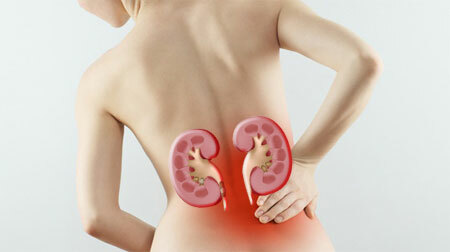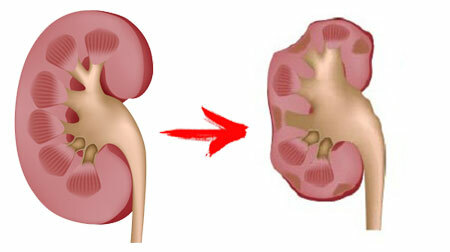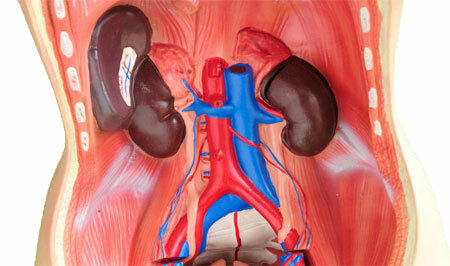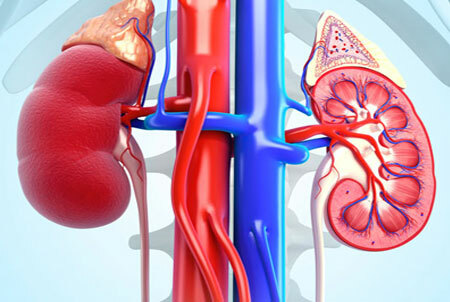Human kidneys are a paired organ of the urinary system, the main purpose of which is the formation of urine. Development of renal failure occurs when the kidneys work is grossly disrupted, and therapeutic assistance has not been provided in a timely manner.
What is it?
"Renal failure" disease is a serious condition developing against other diseases or lesions and is characterized by impaired renal function. Depending on the severity and duration of the flow, distinguish between acute and chronic forms of renal failure. Pathology can affect people of any age and gender, but young women are more often affected by kidney problems.

In most cases, the cause of renal failure is a disorder in the organ itself, caused by external or internal factors. However, diseases that are absolutely unrelated to the kidneys can also provoke pathology. The most common reasons are:
- Congenital abnormalities of the kidney structure;
- Chronic diseases in the body - diabetes, autoimmune diseases, liver cirrhosis or liver failure, urolithiasis;
- Inflammatory diseases of the kidneys that have not been treated or have occurred with complications;
- Malignant neoplasms in renal tissue;
- Blockage of ureters by concrements, which results in retention and accumulation of urine in the kidneys, overgrowth of the organ and pathology formation;
- Chronic glomerulonephritis;
- Intoxication of the body;
- Massive blood loss or a decrease in the volume of circulating blood, for example, with burns;
- Poisoning with chemicals and poisons;
- Self-medication with nephrotoxic drugs, prolonged use of antibiotics or other medicines, without the appointment of a doctor.
In some cases, kidney failure in women can develop during pregnancy.
Contents
- 1 Symptoms of renal insufficiency
- 2 Symptoms of renal failure in women
- 2.1 Symptoms of renal failure in pregnancy
- 3 Treatment of renal failure
- 3.1 Complications of
Symptoms of renal failure
Signs of renal failure in women largely depend on the degree of organ failure:
- Initial degree- At this stage, there are no clinical symptoms, but in the tissues of the organ there are already pathological changestion;
- Oliguric stage - symptoms appear and grow: the amount of urine released per day decreases, lethargy, inhibition, nausea, vomiting, palpitation, shortness of breath, cardiac arrhythmia, abdominal pain( duration of this stage up to 10 days);
- Polyuric stage - the patient's condition returns to normal, the daily amount of urine increases and often corresponds to physiological parameters, however at this stage, the development of infectious and inflammatory diseases of the urinary system;
- The stage of rehabilitation - the kidneys begin to function fully and almost completely restored. If a large number of nephrons has been damaged during acute renal failure, then complete restoration of the function of the organ is impossible.
Symptoms of renal failure in women
 The chronic form of the disease develops as a result of the progression of acute renal failure. The condition is characterized by the destruction and death of the kidneys( glomeruli, nephrons, parenchyma), as a result the body can not perform its functions - this leads to violations in the work of other vital organs.
The chronic form of the disease develops as a result of the progression of acute renal failure. The condition is characterized by the destruction and death of the kidneys( glomeruli, nephrons, parenchyma), as a result the body can not perform its functions - this leads to violations in the work of other vital organs.
Depending on the degree of damage to the kidney tissue and the severity of the patient's condition, several stages of chronic renal failure are distinguished with different symptoms:
Stage of latent flow( latent) - clinical manifestations of the disease are absent, so the patient does not know about his condition - however, with increasing physical exertion, weakness, dry mouth, drowsiness, lethargy, fatigue, urinary incontinence;Symptoms of renal failure in pregnancy
Pregnancy can develop a syndrome of kidney failure due to impaired renal function as a result of the transmission of ureters, renal artery or organ tissue to the growing uterus. In this case, the future mother has the following clinical symptoms:
- A sharp decrease in the volume of daily urine, up to full anuria;
- Increase in blood pressure indicators;
- The appearance of protein in the analysis of urine;
- Swelling of the face and extremities;
- Nausea, vomiting;
- Lethargy, weakness, headaches;
- Signs of body intoxication;
- Pale skin.
The first appearance of such symptoms should immediately contact your gynecologist. Severe renal failure during pregnancy can adversely affect the development of the fetus in the uterus, right up to its antenatal death.
Treatment of renal failure
The sooner the renal failure is identified and treated, the higher the chances for complete recovery of the patient.
The acute form of the disease is a reversible condition, for the treatment of which it is important to determine the causes of organ failure. Restoring the normal functioning of the kidneys is helped by treatment of the underlying disease and hemodialysis.
With concomitant inflammatory diseases of the urinary system, antibiotics and immunostimulants are prescribed.
In case of renal failure caused by severe poisoning, toxins or drugs, the patient is assigned hemosorption and plasmapheresis. In acute blood loss - transfusion of blood and plasma substitutes.
With a chronic form of pathology, it is impossible to completely restore the kidneys, but it is possible to stop the development of irreversible processes and slightly improve the patient's quality of life. For this, the patient is prescribed regular dialysis and a special diet.
Nutrition for renal failure should be balanced, and the products are easily digestible. It is advisable to arrange unloading days 1-2 times a week. Daily on the table should be present dairy products - kefir, yogurt, low-fat cottage cheese.
In addition to the basic treatment plan compiled by the doctor individually, the patient must strictly follow the recommendations of the specialist:
- Exception of physical activity;
- No stress;
- Refusal from alcohol and smoking;Bed rest in an acute stage.
In chronic renal failure, after normalization of the general condition of the patient, if possible, an operation is performed to transplant the donor kidney. This greatly helps to improve the quality and extend the life of the patient.
Complications of
With progression of symptoms and lack of timely treatment, the risk of complications is high:
- Transition of the disease into a chronic form;
- Uremical coma;
- Sepsis.
If the kidney failure is not treated, the patient quickly becomes fatal.



